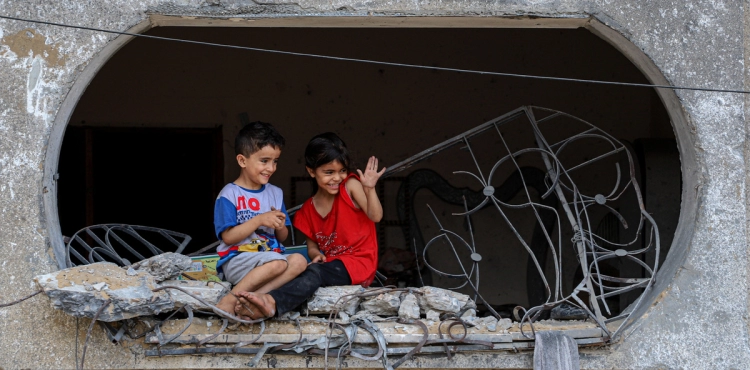The sound of explosions and the roar of Israeli planes still dominate the scenes of children in the coastal Gaza Strip, causing psychological symptoms in them, despite the end of the last wave of tension between the Islamic Jihad Movement and Israel about two weeks ago.
Some children who lived through difficult moments during the last wave showed many symptoms, most notably lack of sleep, anxiety, bedwetting, staying attached to their parents, and avoiding leaving the house, according to local psychiatrists.
On the ninth of May, military tension erupted between the Israeli army and the Islamic Jihad movement , which lasted for 5 days, after sudden Israeli air raids on the Strip killed 3 of the movement´s senior military leaders.
As a result, the joint military operations room of the Palestinian factions exchanged shelling with the Israeli army, killing 33 Palestinians, including 5 children, 3 women and two elderly people, 11 leaders and members of the Islamic Jihad and one Israeli, according to official statistics .
After complex and intense negotiations during the military tension, Egypt succeeded in reaching a cease-fire between the Islamic Jihad movement , whose delegation was present at the time in Cairo, and Israel to avoid further human and material losses on both sides.
As soon as the sound of explosions and the roar of planes stopped, the people of Gaza gradually resumed their usual daily rituals, as they returned to their places of work, schools and universities, and shops opened their doors.
However, the matter does not seem similar to Haneen Abu Obeid, 11 years old, from the city of Deir al-Balah in the central Gaza Strip, who lost her family´s house in a raid by Israeli planes , which led to its complete destruction.
Since then, the Hanin family has been living in a rented house far from their destroyed home, but they still have nightmares every night, which makes them feel that the Israeli "war" on the Gaza Strip is not over yet.
"When I wake up from my sleep, the nightmares do not end (...) When I hear any loud sound, I think it is an Israeli raid that will attack the place," the little girl with a slim body told Xinhua.
"I cannot go out on my own from the house or even play in the street with my friends from the neighborhood," Haneen added, while her family members are trying to get her out of her psychological state, noting that people in Gaza do not live in an unsafe place.
Haneen was not in this situation, as the child Muhammad al-Dirawi (10 years old), her neighbor, lives with the same feeling of anxiety, fear and depression, saying that his life has been turned upside down since his house was destroyed in an Israeli raid.
Al-Dirawi told Xinhua that the recent tension and the accompanying air strikes caused loud explosions that made him isolated and afraid all the time, and he could not do anything or go to the store near his residence.
Both Hanin and Muhammad express their hope to live in peace as soon as possible without witnessing more military tensions that would kill more civilian people and destroy more and more residential facilities.
Since 2007, Israel has imposed a tight blockade on the Strip following the Hamas takeover, in addition to that, Israel has launched four large-scale military operations and dozens of limited military tensions.
Nine out of ten children in Gaza suffer some form of conflict-related trauma due to the Israeli military operations in the strip, according to a report issued by the Euro-Mediterranean Human Rights Monitor, an independent non-profit organization active in Geneva in 2021.
More than half of the youth in the Gaza Strip , including children, need psychological support after the recent tension in the Strip, according to Sami Oweida, a Gaza-based psychiatrist and head of the non-governmental Gaza Mental Health Programme.
Awaida told Xinhua that the repeated Israeli attacks actually lead to a clear imbalance in human behavior, whether in adults or children. As a result of this bombing, what is called psychological trauma appears, which has different responses at the behavioral, cognitive, emotional and physical levels.
Awaida believes that the Israeli wars cause obvious stress on the psychological and behavioral level of the local population, noting that the children of Gaza need to live in peace and find a final solution to the conflict with Israel to find their way to normal life as well as all other people around the world.












